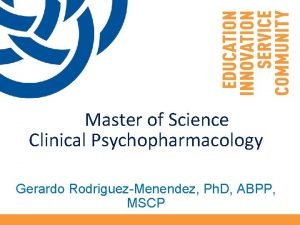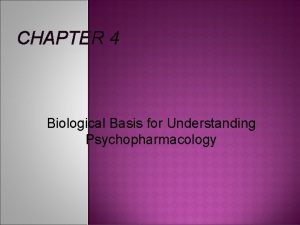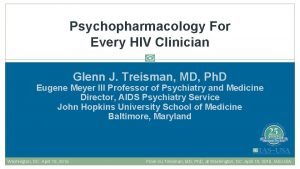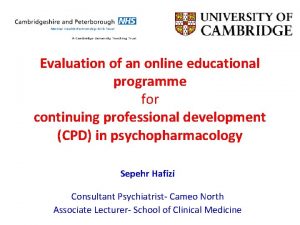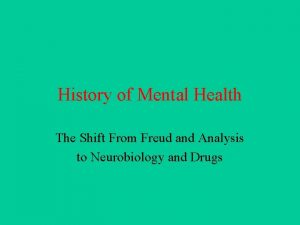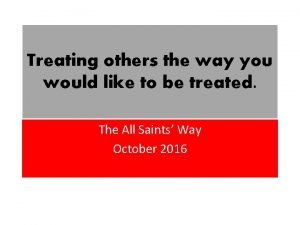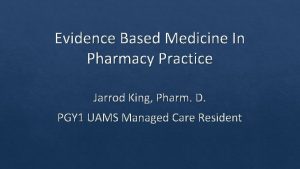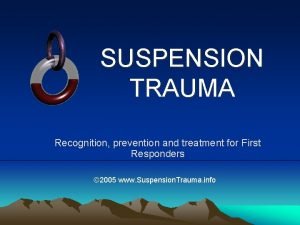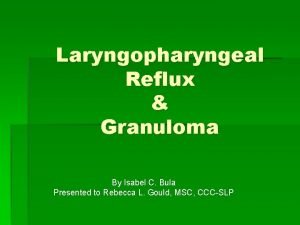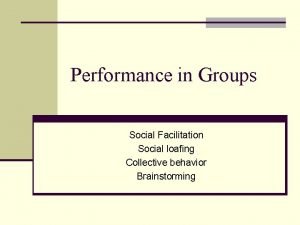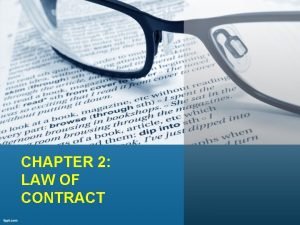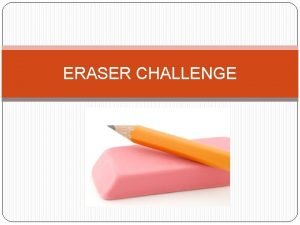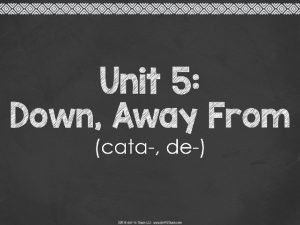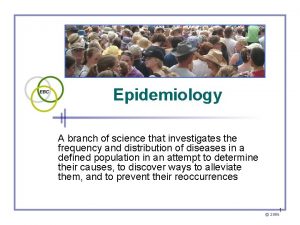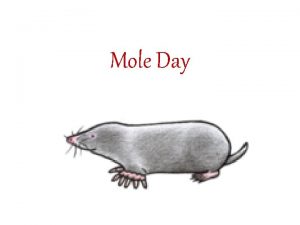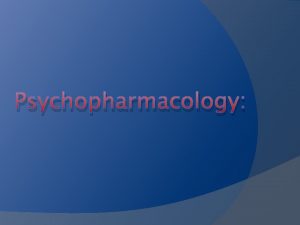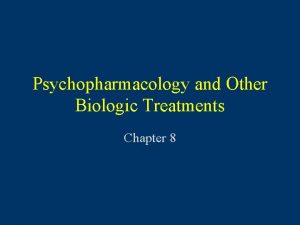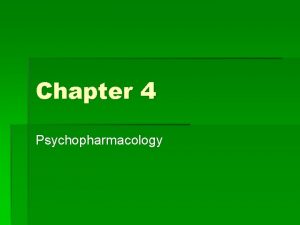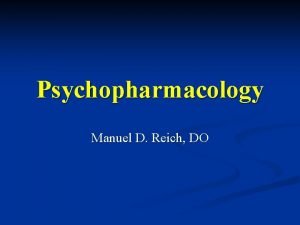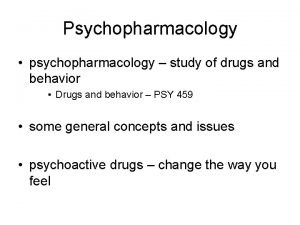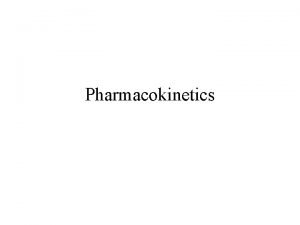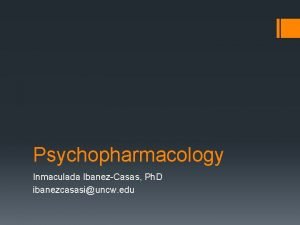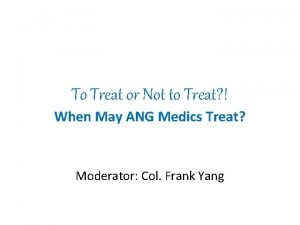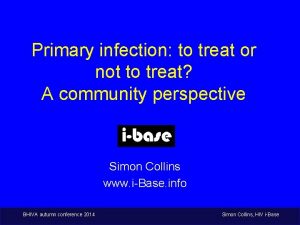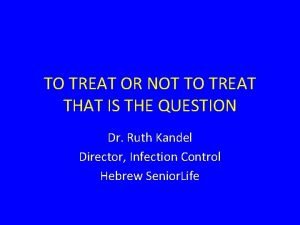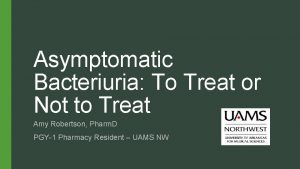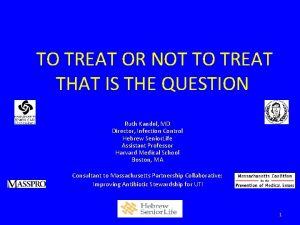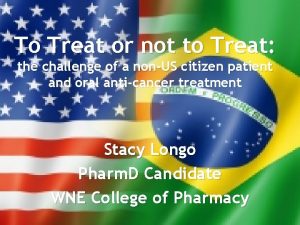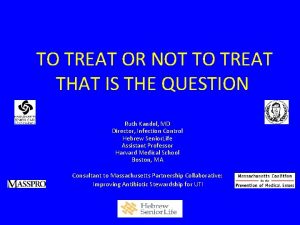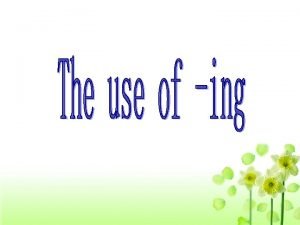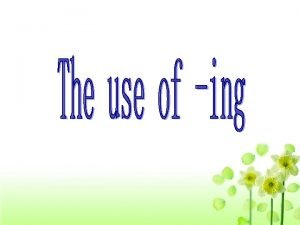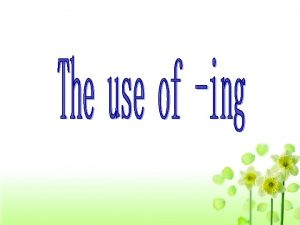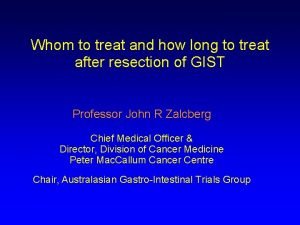Psychopharmacology To Treat Or Not To Treat An






























- Slides: 30

Psychopharmacology To Treat Or Not To Treat An Advanced Nurse Practitioner’s Perspective April Powers, MSN, RN, FMHNP-BC

Learning Objectives List barriers which can potentially impede treatment Explain prevalence and impact of mental illness Explain neurobiology of psychotropic drug actions Communicate the actions, most common side effects and therapeutic uses of psychotropic drugs Explore alternative options to treatment

Barriers to Treatment • Stigma • Financial/Lack of coverage • Lack of trust • Lack of awareness • What barriers have you encountered as a provider?

Mental Health Facts (NAMI 2015) • Millions are affected each year • Depression leading cause of worldwide disability • Approx. 10. 2 million adults suffer from mental illness and addiction disorders • Nearly 60% of adults with MI did not receive treatment the previous year • Suicide is the 3 rd leading cause of death in youth (ages 10 -24)

Psychopharmacology

Terms v Pharmacology-study of what drugs do & how they do it v Pharmacokinetics-study of what the body does to drugs (absorption, distribution, metabolism, & excretion) v Pharmacodynamics-study of what drugs do to the body (receptors, ion channels, enzymes, and carrier proteins) v Psychopharmacology- study of the use of medications in treating mental illness and it’s effect on the brain v Neurotransmitters-send chemical messages to the brain (cell body, dendrites, axon) v Receptors-target site for drug actions

Terms Continued Dopamine-essential NT to the normal fxn of CNS GABA-NT found in the CNS; inhibitory effects Norepinephrine-NT causes vasoconstriction & increases BP, HR, sugar levels in blood Serotonin-regulates normal behavior i. e. sleep, mood, pain, appetite, peristalsis, vasoconstriction Glutamate-potent excitatory NT aka “master switch”---learning/memory Acetylcholine-widely distributed in the brain & PNS; synthesized & released by cholinergic neurons Controls fxn i. e. salivation, GI motility, pupil size, mucus secretion

Role of neurotransmitters

Types of Neurotransmitters Acetylcholine Dopamine Glutamate Serotonin Opioid Neuropeptides GABA Norepinephrine

Common Psychiatric Disorders & NT Neurotransmitters • Acetylcholine • Dopamine • Norepinephrine • Serotonin • GABA • Glutamate • Opioid Neuropeptides Psychiatric Disorder Suspected Deficit • Decreased • Increased, Decreased • Depression • Decreased • Depression, OCD, Schizophrenia • Decreased, Decreased • Increased • Decreased • Alzheimer’s Dz, Cognitive Impairment • Schizophrenia, S. A. , Parkinson’s • Anxiety • Bipolar, Psychosis from ischemic neurotoxicity • Substance Abuse

Mental Health Overview • Medications play a pivotal role in treating MI • Treatment varies- • Not all medications produce the same effect • Information change frequently • FDA establish guidelines/approval • Clinical research is conducted • Client safety is a priority • Increased use of psychotropic drugs (Cassels, 2011) (psychotherapy/psychopharm) • 1 in 5 Americans took at least one psychotropic drug • Women more frequent users • Greater use in children

Pharmacological Considerations What is the dz? What are the target sx? Phase of illness (acute, relapse, recurrence) Personal/familial hx & responses to certain medications Co-morbidity issues Drug-drug interactions Cultural beliefs Discuss informed consent & client’s understanding of target sx, benefits, risks, & alteration to tx Monitor side effects (CYP 450 –hepatic enzyme interactions can induce/inhibit metabolism Pregnancy—”to prescribe or not to prescribe”

Genesight Testing • Finding right drug/dose • Genetic test newest technology • Covered by Medicare, Medicaid, Commercial insurance plans • Is it effective?

Evolution in treatment 1 st century---- “Black bile” 1930’s----ECT 1940’s----Lithium 1950’s----TCAs 1960’s----MAOIs 1980’s----SSRI 1990’s----Dual reuptake inhibitors, receptor modulators

Commonly used medications

Selective Serotonin Reuptake Inhibitors Increase serotonin levels in CNS by inhibiting reuptake Effective for treating PTSD, OCD, Bulimia, GAD, social phobia, PDD Most commonly rx Celexa, Lexapro, Prozac, Luvox, Paxil, Zoloft

Tricyclic Antidepressants Considered 2 nd line drugs for treating MDD Dirty side effects Monitor serum levels to reach therapeutic levels/sx control Avoid abrupt discontinuation Avoid rx to suicidal individuals DO NOT TAKE WITH MAOIs—LETHAL!!! Most commonly rx Elavil, Doxepin, Anafranil, Tofranil, Nortriptyline

Monoamine Oxidase Inhibitors LAST RESORT DUE TO DANGEROUS FOOD & DRUG INTERACTIONS HYPERTENSIVE CRISIS IS LIFE THREATENING —Can occur in conjunction with foods high in tyramine Special diet is required Serious drug-drug interactions Poor adherence due to dirty side effects & dietary restrictions Most commonly rx Parnate, EMSAM, Nardil, Marplan

Other Antidepressants Serotonin-Norepinephrine Reuptake Inhibitor (SNRIs) Norepinephrine-Dopamine Reuptake Inhibitors (NDRIs) Serotonin Agonist & Reuptake Inhibitors (SARIs) • Inhibit dual reuptake • Dual action • Action very selective on NT • Very selective on NT • Agonist of serotonin 5 HT-2 receptors • Elevate serotonin & norepinephrine by • Elevate dopamine & norepinephrine • Action very selective on NT inhibiting reuptake • Treatment for depression, anxiety, chronic pain • Take with food decrease N/V • Help regulate mood • Most commonly prescribed • Effexor, Cymbalta levels • Most commonly prescribed • Wellbutrin, Remeron • Elevate serotonin levels by inhibiting serotonin reuptake • Most commonly prescribed • Trazodone

Antianxiety Most common human emotion is anxiety Antidepressants are rx to help treat anxiety disorders Benzodiazepines are commonly rx----OARRS Ativan, Klonopin, Valium, Xanax PMHNP role is to assess normal –vs- pathological levels of anxiety Non-benzo’s are effective Buspar, Gabapentin, Clonidine, Propranolol, Vistaril

Case Study Angel, a 26 -year-old teacher and mother of 4 children, accompanied by her spouse, presents to her PCP with c/o lack of energy & inability to sleep, both which are getting worse. Sx are affecting her ability to take care of family & job duties. Per spouse, Angel often have crying spells, decreased appetite, & decrease concentration. She has thoughts of not wanting to live. Spouse states, “I thought she was just having a bad day”. No significant medical problems. No Ao. D use. Family hx Ao. D use & “nervous breakdowns. ” Appear disheveled, hair uncombed. Appear tired. Poor eye contact. Speaking low tone. Flat, constricted affect. Deny hallucinations. Thoughts are organized & appropriate. Report having SI of overdosing on OTC meds. A&Ox 3. Judgment/Insight good.

Mood Disorders Treatment Most common of all psych illnesses Commonly tx provided by PCP Studies indicate mood disorders are not well identified Client’s benefit from SSRI, moodstabilizers, anti-anxiety medications

Types of Mood Stabilizers Used to treat mood disorders i. e. Bipolar, mood swings associated with other disorders, & augment tx for depression Lithium “gold standard” Anticonvulsants are effective Watch those side effects! Various types/commonly rx Depakote, Lithium, Lamictal, Trileptal, Abilify, Tegretol, Seroquel, Zyprexa, Risperdal, Latuda, Rexulti, etc.

Antipsychotics Commonly rx to tx Psychotic disorders, schizophrenia, schizoaffective Rx as augment tx for depression, insomnia, anxiety Monitor closely (NMS, TD)---obtain AIMS every 6 months Serious side effects decrease adherence Increased risk of metabolic syndrome with use Oral –vs- Injections

Types of Antipsychotics Typical-1 st generation Atypical-2 nd generation Thorazine Clozapine Trilafon Quetiapine Haldol Olanzapine Loxapine Risperidone Mellaril Ziprasidone Paliperidone Aripiprazole

Metabolic Syndrome

Attention-deficit/hyperactivity disorder Treatment • No cure; effective tx i. e. medications, psychotherapy, education/training, or a combination of tx • Stimulants most commonly rx—increases dopamine & NE —both which play a pivotal role in thinking & attention • • Can raise blood pressure, heart rate, anxiety, • decrease appetite, sleep disturbances, tics, • affect mood/personality, h/a • Highly abused Non-stimulants are rx @ times • May require a prior auth • Not addictive • May not be as effective

ADHD Medications Stimulants Non-stimulants Methylphenidate Clonidine Amphetamine Guanfacine Dextroamphetamine Strattera Lisdexamphetamine Dimesylate Wellbutrin

Other Treatment PTSD Sleep Disorder CAM • Prazosin • Remeron • Yoga • clonidine • Trazodone • Massage • Doxepin • Meditation • Melatonin • Art/dance therapy • Antipsychotics, antidepressants • CBT/DBT • Sleep hygiene

Questions
 Boundaries meme
Boundaries meme Clinical psychopharmacology salary
Clinical psychopharmacology salary Biological basis for understanding psychopharmacology
Biological basis for understanding psychopharmacology Cosmetic psychopharmacology
Cosmetic psychopharmacology Nei master psychopharmacology
Nei master psychopharmacology Cosmetic psychopharmacology
Cosmetic psychopharmacology English 9 vocabulary unit 1
English 9 vocabulary unit 1 How did the scotch half breed treat the dogs
How did the scotch half breed treat the dogs Factors that helped spread christianity
Factors that helped spread christianity Treat others the way you would like to be treated
Treat others the way you would like to be treated How does juliet treat paris?
How does juliet treat paris? Earl treat aa
Earl treat aa Mffmm
Mffmm Calculate number needed to harm
Calculate number needed to harm The ant and the grasshopper by somerset maugham
The ant and the grasshopper by somerset maugham Suspension trauma treatment
Suspension trauma treatment Mylantah
Mylantah Intention to treat analysis
Intention to treat analysis What do the words that appeared on cyrus's tomb
What do the words that appeared on cyrus's tomb Social facilitation
Social facilitation Guthing vs lynn case
Guthing vs lynn case How did henry ford treat his workers
How did henry ford treat his workers The eraser game
The eraser game Which seedless plants have been used to treat bee stings?
Which seedless plants have been used to treat bee stings? Treat someone with contempt
Treat someone with contempt Summary of act 2 scene 4 romeo and juliet
Summary of act 2 scene 4 romeo and juliet Number need to treat
Number need to treat Are the mrunas real
Are the mrunas real Which seedless plants have been used to treat burns
Which seedless plants have been used to treat burns Colours of halloween song
Colours of halloween song Mole day treat ideas
Mole day treat ideas

